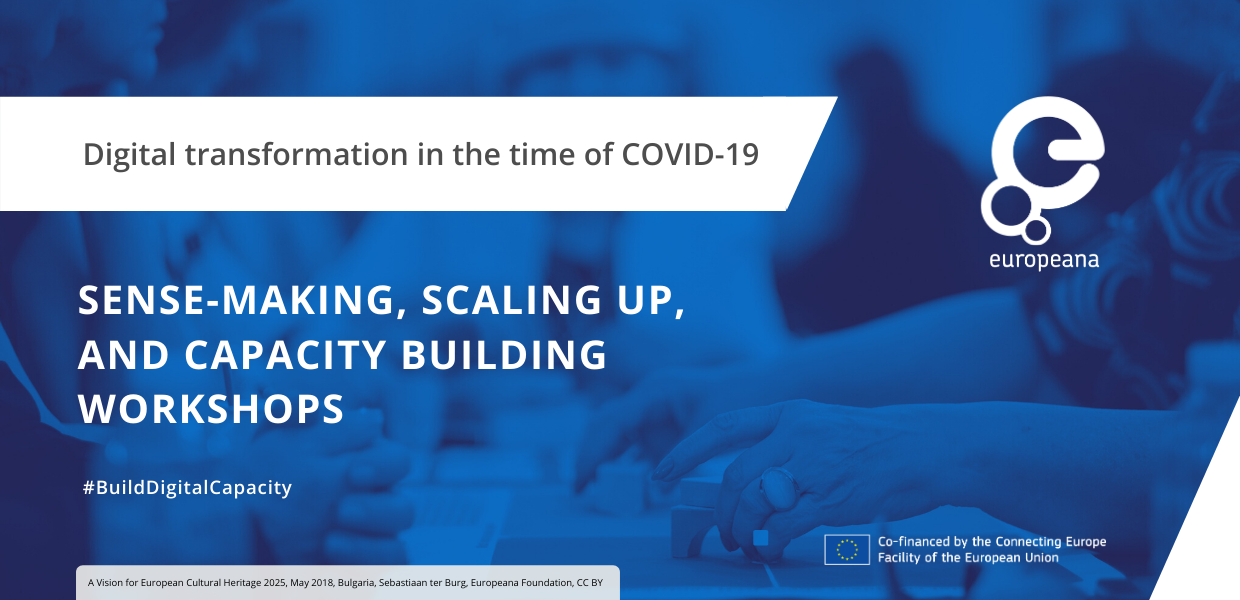Digital transformation in the time of COVID-19: exploring the immediate impact
Throughout June, Europeana is bringing together 60 cultural heritage professionals from across Europe for a special series of peer-to-peer workshops on ‘Digital transformation in the time of COVID-19’. In this post, one of the process’s facilitators, Jasper Visser, shares a few of the topics which emerged in the first week of the workshops focusing on the immediate impact of COVID-19 and asks you to reflect on your own experience of the crisis.

- Title:
- A Vision for European Cultural Heritage 2025
- Creator:
- Sebastiaan Ter Burg
- Date:
- May 2018, Bulgaria
- Institution:
- Europeana Foundation
- Copyright:
- CC BY
COVID-19 has changed the daily practice of cultural heritage organisations across the continent. The sector changed visibly — museums closed, libraries moved part of their services online, teams work from home. And it changed in more subtle ways — organisational hierarchies shifted, while working from home has meant that the boundaries between the personal and the professional blurred even further. The thinking behind Europeana’s sense-making process about digital transformation in times of COVID-19 is that all these changes combined provide insights into possible futures for digital cultural heritage.
In the first week of the sense-making workshops, we explored the immediate impact of the COVID-19 crisis on individuals, teams, organisations, and our audiences. We did so collaboratively. The 60 participants observed how COVID-19 affected them and their organisations, then collectively reflected on this and ultimately joined in an exploration of our shared and unique experiences.
What we found in this first week is that the crisis is affecting everyone differently. The stories and experiences of the 60 participants are all unique to their country, organisation and personal and professional circumstances. Although we appear to be going through a shared moment in time, there are many ways in which we experience it.
We believe that there is wisdom in this diversity in our sector. While we prepare for a successful digital future, we shouldn’t look for one-size-fits-all solutions. Instead, we need to understand our sector’s full potential and the entire range of challenges. A few examples of the ways in which the experience of COVID-19 has been different for participants that surfaced in the workshops so far include:
-
Some European countries were fully prepared for public services to go digital and others are still struggling with the essentials.
-
Some organisations quickly developed new digital audience services and some experienced an almost complete disconnect with their community.
-
The crisis seems to reinforce existing hierarchies in some organisations and others have seen relationships along the chain of command relax.
-
Digital teams have moved to the heart of some GLAMs, and in others, digital has become a shared responsibility of everyone in the organisation.
-
Even our most digitally conservative colleagues now observe the great potential of digital for our organisation, and we’re also seeing the risks of digital pollution.
-
Working from home enables participants to be more productive and many of us are also digitally fatigued.
-
We can have sustained conversations about the digital transformation of cultural heritage and also lack a common vocabulary to talk about it.
These apparent paradoxes highlight that within the GLAM sector different realities exist at the same moment. One organisation’s strength is another organisation’s challenge. To tap into the full potential of Europe’s GLAMs we’ll need to find approaches to catalyse our strengths while we collectively address our challenges.
And what about you? We’ve found that people’s individual experience during recent months is shaped by personal circumstances, working conditions, and by other factors. What are the factors that have shaped your experience of the COVID-19 crisis so far and ability to be successful and satisfied in your job?
Please share your thoughts about the factors that shaped your experience of the COVID-19 crisis on Twitter with the hashtag #BuildDigitalCapacity. Feel free to tag @Europeanaeu, @mpedson or @jaspervisser as well. Your insights and ideas will help us shape the conversations and outcomes of this process.
In the coming weeks, we will try to learn much more about the diversity of responses to the COVID-19 pandemic. With the participants in the sessions, we will try to discover and analyse patterns and shared characteristics of our strengths and our challenges. Together, we will look to understand the complex dynamics of what enabled some GLAMs to face the crisis proactively while others struggle, and what success actually means and looks like for digital cultural heritage in a post-COVID-19 world.
Thanks for your contributions and we look forward to our continued working together to understand the full digital potential of GLAMs.

